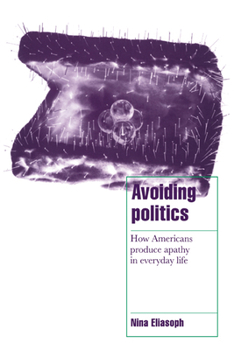Avoiding Politics: How Americans Produce Apathy in Everyday Life
(Part of the Cambridge Cultural Social Studies Series)
Select Format
Select Condition 
Book Overview
Civic groups are said to be the fount of democracy, but these vivid portraits of American life reveal an intriguing culture of political avoidance. Nina Eliasoph accompanied volunteers, activists and... This description may be from another edition of this product.
Format:Paperback
Language:English
ISBN:052158759X
ISBN13:9780521587594
Release Date:August 1998
Publisher:Cambridge University Press
Length:344 Pages
Weight:1.23 lbs.
Dimensions:0.8" x 6.4" x 9.0"
Customer Reviews
2 ratings
A Good Read!
Published by Thriftbooks.com User , 21 years ago
Nina Eliasoph describes the ways that volunteers get involved - or don't get involved - in political activity. Most volunteers, she notes, intentionally shy away from discussing the core political issues related to their volunteer efforts. She suggests that these volunteers have learned apathy in order to avoid the confrontation that public political debate might provoke. The volunteers she studied are willing to raise difficult issues in private, but not in public. Instead of finding - as might be expected - that joining groups helps people become activists, she finds the opposite. Group membership seems to blunt personal action. Eliasoph can be academic and repetitious, in that she uses multiple examples to make a single point. So, while respecting her research and her passion, we from getAbstract suggest this book is primarily aimed at political scientists and at readers who are truly concerned that more institutions should foster public debate and more of us should engage in it. The author is deeply worried about apathy's effect on democracy. The question is, do you care?
a brilliant refutation of Robert Putnam
Published by Thriftbooks.com User , 25 years ago
In this surprisingly readable study, Eliasoph has done several wonderful things. She has demonstrated anew the value of qualitative research (oft-maligned as 'soft' by those who should know better). She has recast alienation as a product, rather than a default mode. Most impressively, though, she has produced a devastating attack on Robert Putnam's theory of 'social capital.' Putnam argues that citizens learn the skills of democratic participation by joining groups. Eliasoph shows, convincingly, how the dynamics within groups vitiates any substantive political conversation, and even steers conversation to the lowest common denominator, rewarding blowhards. Fascinating, readable, endearing. Brava!






